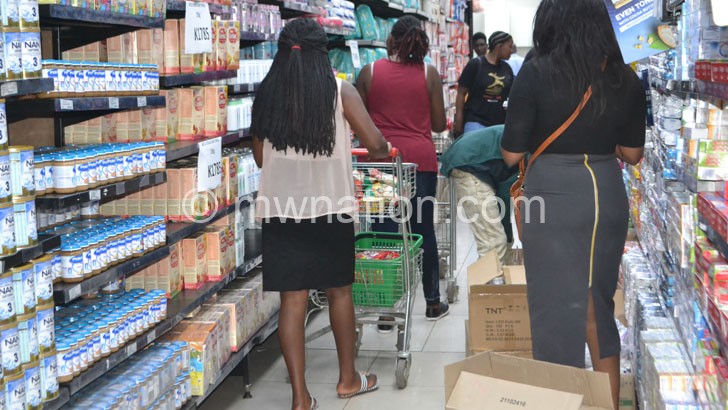Rising cost of living eats into incomes
The rising cost of food, transport and basic household items are having a knock-off effect on consumers’ incomes, and pushing more Malawians into poverty.
Disposable income is often monitored as one of the many key economic indicators used to gauge the overall state of the economy.

At 2.9 percent, according to the Reserve Bank of Malawi (RBM), Malawi’s national savings rate is below the world average of 12 percent, which economic analysts say negatively affects economic development.
But with the recent prices increases of petroleum products, electricity and food items, the cost of living for Malawians has continued to rise, making it hard for low income earners to make ends meet.
As of April 2021, a family of six required at least K209 000 to survive in a month, against the minimum wage of K50 000, according to figures from the Centre for Social Concern (CfSC).
The figures, according to CfSC economic governance programme officer Bernard Mphepo, show that levels of income for the average Malawian is below minimum requirements for the cost of living.
He said: “The increase in cost of living which has been worsened by the Covid-19 situation is impacting the living standard of Malawians yet most Malawians cannot afford basic necessities such as food, transport, education and health.
“While the minimum wage was raised to the current K50 0000 which is commendable, some workers have been pushed out of employment as some employers could not manage to pay their workers. This has been another blow to Malawians.”
For one Esmie Gombwa life has moved from bad worse in view of the rising cost of living.
Gombwa, a mother of eight, confided to Business Review in interview, it has become hard to purchase even a small plastic bag of charcoal which is now selling around K300 from K200 earlier this year.
One small plastic bag of charcoal is, however, not enough to cater all cooking needs for Gombwa but three or four in a day which means she uses K900 in a day or K27 000 in a month for energy.
“Things have not been any better for me as I have shifted from one business to another, trying to make ends meet. I now sell fried dry fish [kanyenya] which fetches me about K4 000 in a day.
“But with the rise in transport costs, everything has also been hiked following which I now have little left for my survival. I am forced to find extra piece work including on weekends just to earn additional money to support my family,” she explains.
Similary, Tendai Kaduya, a second hand clothes seller in Blantyre, says she is also reeling from the high costs goods and services.
“With the price rises, my business has greatly been affected because I had no choice but to increase my prices. In the end, people no long buy as they used to because I know they also do not have money. Ultimately, I have lost customers and my revenues has drastically fallen,” she said.
With an average income of about K60 000 per month realized from her vegetable business, Martha Chabwera, a Chiwembe township resident, says she has cut on using electricity for cooking and other uses to survive.
“The same K4 000 which could take me close to a month might now take me two weeks or less. I have to go a day without using electrical appliances just to save on power,” she said.
Consumers Association of Malawi (Cama) executive director John Kapito also admits that consumers are now feeling the pinch of price hikes.
“The current situation is hard economically and socially we do not know where this leads to but one can predict that the current economic situation has negatively impacted heavily on all sectors of life.
“We would have loved to see the current budget building in mechanisms on how to cushion the key sectors provide a lot stimulus support to the middle class and small businesses that only rely on an active market ignoring these facts that we have Covid-19 which has slowed the world economy,” he says.
Kapito said unbelievable to understand how Malawians are coping with these hard economic market pressures saying this is also happening at a time when we are struggling with the Covid-19 which has forced most businesses to be closed and most consumers are either retrenched.
Meanwhile, economists have also feared the worse, economically in view of the escalating prices.
The Economics Association of Malawi (Ecama) said the recent increases in electricity tariffs and fuel pump prices will likely worsen the inflation outturn in the remaining months of the calendar year.
“If market players deem the increase in current inflation as temporary, price increases are not expected to persist. Thus, inflation outturn is likely to remain as earlier projected for 2018 and at five percent target in the medium-term,” she said Ecama president Lauryn Nyasulu.
On his part, associate professor of economics at Malawi University of Business and Applied Sciences Betchani Tchereni observed that any price increases which does not come with a corresponding increase in comes erodes into the welfare of households.
He said that while consumption expenditure is good for the economy as it is an important factor in fueling the wheels of economic growth, when it is reduced due to higher prices it becomes concerning.
“When the prices are too high, some manufacturers may not raise the price level but compromise on the quality of the products they sale on the market. This in itself is dangerous for the economy,” he said.
However, Tchereni lamented that the nature of the public purse suggests that the government does not have a lot of options to cushion low income earners.
He said: “Even unemployment benefits cannot work. Even if the government was to go for a subsidy programme for all essential commodities again it would not work as government does not have enough resources.”





